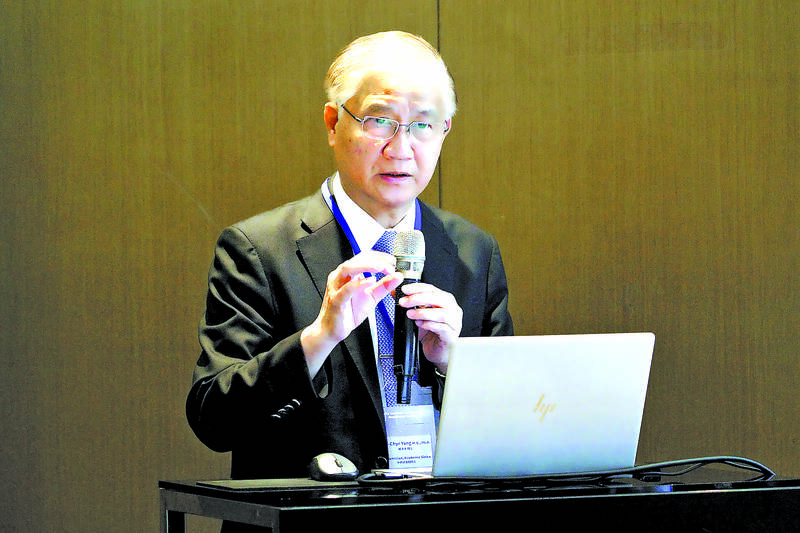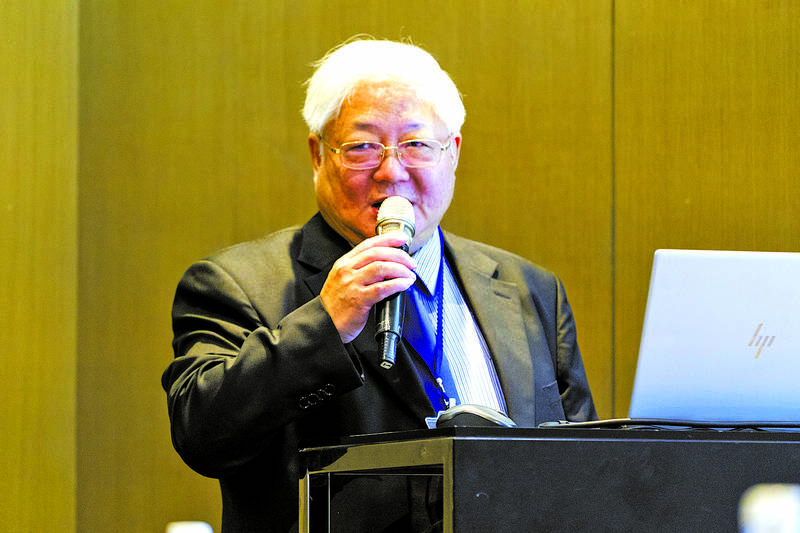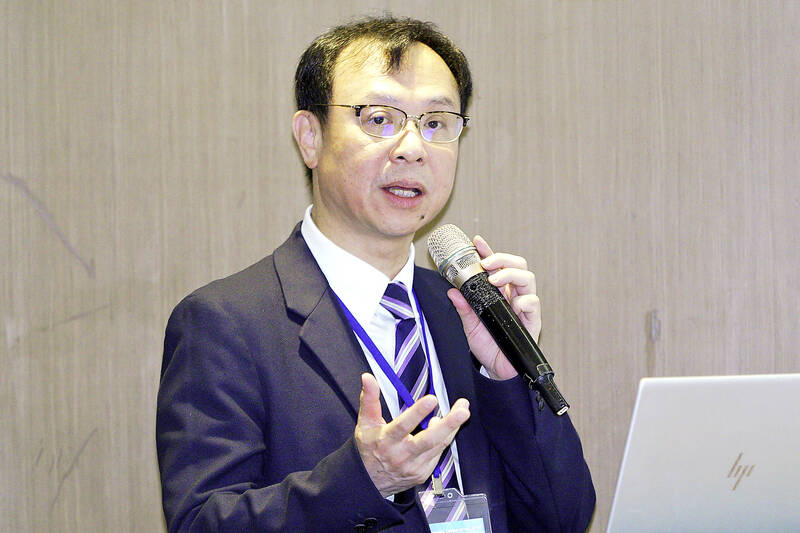Lung cancer, which is expensive to treat and has a high death toll, is prevalent in Taiwan, causing more deaths than any other type of cancer for 19 years in a row. A high proportion of people — about 60 percent — have late-stage cancer by the time they are diagnosed. Since the Ministry of Health and Welfare launched government-funded low-dose computed tomography (LDCT) screening in July last year, it has helped to increase the rate of early-stage diagnosis.
In the face of the lung cancer threat, Academia Sinica academician Yang Pan-chyr (楊泮池) called on the government to improve lung cancer prevention and control by establishing a national lung cancer office.
Yang proposed two targets for 2030: doubling the number of people screened for lung cancer at an early stage and doubling the number of people who survive for five years or more after diagnosis.

Photo: Lin Hui-chin, Taipei Times
He said that overcoming medical obstacles is another urgent task in the treatment of later-stage lung cancer.
The National Health Insurance (NHI) system is too slow in approving reimbursement for new drugs, so it must move more quickly to catch up with international standard treatments and progress toward the goal of doubling the survival rate of stage IV lung cancer patients within the next five years, Yang said.
Yang recently took part in an Asia-Pacific lung cancer prevention and treatment roundtable attended by experts from Taiwan, Japan and South Korea.

Photo: Lin Hui-chin, Taipei Times
Addressing the forum, he said that non-smoking Asian women are equally at risk of getting lung cancer as male smokers.
The great majority — 94 percent — of women who have lung cancer in Taiwan are non-smokers, and most of them have a family history of the disease, he said.
Consequently, although Taiwan has made much progress in reducing the harm caused by smoking, this has not led to a reduction in the number of women with lung cancer, he said.

Photo: Lin Hui-chin, Taipei Times
Lung cancer claimed more than 10,000 lives last year, accounting for one in every five cancer deaths.
Yang said that improving the survival rate requires a comprehensive and intensive screening and treatment strategy that expands early detection and improves late-stage treatment, with different prevention and treatment measures for different target groups.
He said that the government should establish a national lung cancer office, as has been done for liver cancer.
Health Promotion Administration Director-General Wu Chao-chun (吳昭軍), speaking at the same forum, said that 33.4 percent of lung cancer cases in Taiwan are diagnosed at an early stage and 62.9 percent at a later stage.
He said that while there is a 94.3 percent five-year survival rate for stage I lung cancer, this figure plunges to 12.6 percent for stage IV cancer, showing that early detection and treatment is key to survival.
From last year’s launch of LDCT screening for high-risk groups through Sept. 26, 64,000 people had been screened. Among them, 727 people were diagnosed with lung cancer, of whom 85.7 percent were in the early stage of the disease.
Wu echoed Yang’s suggestion that Taiwan should aim to achieve the twin goals of doubling the early diagnosis of lung cancer and doubling the overall five-year survival rate by 2030.
Wu said that Taiwan should also consider using artificial intelligence to assist in interpreting screening results, thus improving the accuracy of diagnosis.
The cost of lung cancer treatment in Taiwan last year was NT$22.4 billion (US$692.62 million), the highest among all types of cancer.
National Health Insurance Administration (NHIA) Director-General Shih Chung-liang (石崇良) said the cost of drugs accounted for more than half of the total at NT$11.6 billion.
The average annual cost of treatment for each stage I patient was NT$100,000, compared with NT$430,000 for stage IV. Early-stage diagnosis could therefore reduce the stress on the national budget, Shih said.
The NHIA has proposed a plan to improve the quality of cancer treatment. It plans to establish a system for institutions to proactively track the cases of people who screen positive for cancer and link this system with the online My Health Bank service to keep patients informed about their cases.
However, it would take time to reverse the proportion of early and late-stage diagnoses. In the meantime, from the aspect of treatment, the threshold for new drugs needs to be lowered.
National Taiwan University Cancer Center superintendent James Yang (楊志新) said that it takes two years on average for new drugs to be approved for reimbursement under the NHI scheme.
Many drugs used in targeted therapy have not been approved for reimbursement, and the use of immunotherapy is highly restricted. Patients therefore have to pay a lot of these costs out of their own pockets, resulting in rich people getting the best treatments while poor people do not.
Shih said that the NHIA would speed up the process of approving the NHI’s coverage of new drugs.
He said that the NHIA has already developed a temporary reimbursement system and plans to set up a dedicated office to improve the health technology assessment process.
Funding for new drugs is expected to double next year, including temporary reimbursements of up to NT$6 billion, Shih said, adding that the NHIA hopes to provide an additional budget and establish a fund to cover the cost of new cancer drugs.

The Mainland Affairs Council (MAC) today condemned the Chinese Communist Party (CCP) after the Czech officials confirmed that Chinese agents had surveilled Vice President Hsiao Bi-khim (蕭美琴) during her visit to Prague in March last year. Czech Military Intelligence director Petr Bartovsky yesterday said that Chinese operatives had attempted to create the conditions to carry out a demonstrative incident involving Hsiao, going as far as to plan a collision with her car. Hsiao was vice president-elect at the time. The MAC said that it has requested an explanation and demanded a public apology from Beijing. The CCP has repeatedly ignored the desires

Many Chinese spouses required to submit proof of having renounced their Chinese household registration have either completed the process or provided affidavits ahead of the June 30 deadline, the Mainland Affairs Council (MAC) said on Thursday. Of the 12,146 people required to submit the proof, 5,534 had done so as of Wednesday, MAC deputy head and spokesperson Liang Wen-chieh (梁文傑) said. Another 2,572 people who met conditions for exemption or deferral from submitting proof of deregistration — such as those with serious illnesses or injuries — have submitted affidavits instead, he said. “As long as individuals are willing to cooperate with the legal

The Ma-anshan Nuclear Power Plant’s license has expired and it cannot simply be restarted, the Executive Yuan said today, ahead of national debates on the nuclear power referendum. The No. 2 reactor at the Ma-anshan Nuclear Power Plant in Pingtung County was disconnected from the nation’s power grid and completely shut down on May 17, the day its license expired. The government would prioritize people’s safety and conduct necessary evaluations and checks if there is a need to extend the service life of the reactor, Executive Yuan spokeswoman Michelle Lee (李慧芝) told a news conference. Lee said that the referendum would read: “Do

Taiwan's Vice President Hsiao Bi-khim (蕭美琴) said Saturday that she would not be intimidated by the Chinese Communist Party (CCP), following reports that Chinese agents planned to ram her car during a visit to the Czech Republic last year. "I had a great visit to Prague & thank the Czech authorities for their hospitality & ensuring my safety," Hsiao said on social media platform X. "The CCP's unlawful activities will NOT intimidate me from voicing Taiwan's interests in the international community," she wrote. Hsiao visited the Czech Republic on March 18 last year as vice president-elect and met with Czech Senate leadership, including